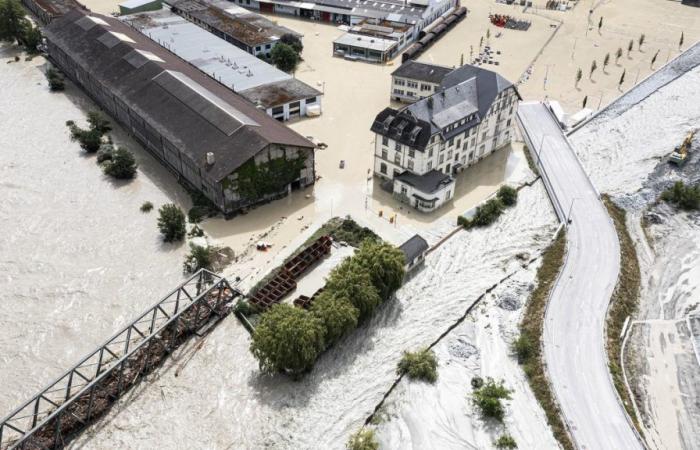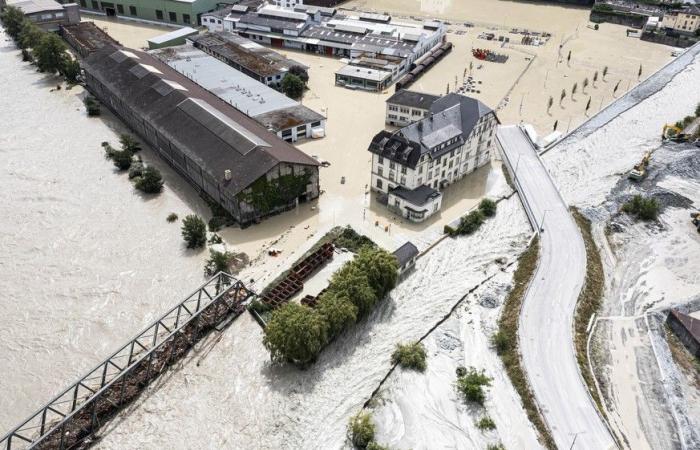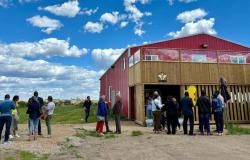Chippis (VS) was flooded by the waters of the Rhône.Keystone
Torrential lava flows, historic floods, collapsing mountain ranges. Switzerland has experienced a few nightmarish weeks. Our country is in the grip of climate change and the future looks bleak.
The rivers overflowed and Switzerland woke up with a hangover, hit by historic floods in the Rhone plain this weekend. Last week it was Morges’ turn to be flooded and before that the Grisons. The weather wreaked havoc and many cantons rediscovered the devastating force of nature.
The bill is likely to be steep and questions are being asked about future bad weather that could jeopardize the safety of Swiss citizens; there have been deaths in Valais, Ticino and Grisons. The material damage has also been colossal.
In Grisons, the A13 motorway has collapsed under the force of the elements. We live in a beautiful natural setting, but it also has its dangers, Alexander Puzrin, professor of geomechanics and geosystems technology at the ETH Zurich, analysed for Watson.
Landslides, numerous landslides, torrential rains and even the formation of tornadoes, Switzerland is facing a density of natural disasters that are visibly growing in scale. The cause? The consequences of climate change that amplify the instability of the weather.
Especially since Switzerland is (still) going through a tense situation on the meteorological front in the coming days. If the floodwaters in Valais began to recede on Monday morning, lessons can be learned.
What a painting for the next ten years?
Now, as the affected cantons lick their wounds, What scenario for the next ten years?
More hot days, drier summers, more precipitation and less snowy winters are to be expected due to climate change in Switzerland, according to the CH2018 climate scenarios for Switzerland.
The Federal Office for the Environment (FOEB), when asked whether Switzerland will experience weekends similar to June 29 and 30 in the next ten years, assures that “it is difficult to estimate whether this will already be felt in the next ten years.” However, one observation is clear:
“In the future, a summer storm could be accompanied by a much greater amount of rain than today.”
The OFEV
If the atmosphere is warmer, it contains more energy and can accommodate more humidity. The potential for violent episodes of rain and storms therefore increases, OFEB tells us.
“The risk increases with warming. However, over the next ten years, weather events could also overlap with this phenomenon.”
The Federal Office for the Environment (FOEN)
The intensity of precipitation will be more frequent and stronger in a water-rich country like Switzerland. “There are also indications that the frequency of floods due to persistent precipitation could increase, causing large-scale flooding and damage,” confirms the body responsible for protection against natural hazards. While it is clear that local episodes of heavy rainfall will increase, “the future development of less frequent large-scale flooding episodes remains difficult to assess,” the OFEB cautions.
Air-Glaciers intervention in Valais, June 30, 2024
Video: Air-Galciers
Is Switzerland ready? in the face of severe weather?
While all stakeholders agree, logically, that absolute security does not exist, lessons can be learned after such events.
“Events like those of 21 and 29 June 2024 are exceptional. What is important in such situations is the proven good interaction of all stakeholders: Confederation (ed: for warnings), cantons and municipalities (ed: on-site measures and control).”
The OFEV
According to the authorities, “prevention and warning have been developed” in recent decades. But reinforcing the alarms is no match for Mother Nature.
While heavy rainfall is a factor in flooding, another factor is snowmelt: “In regions where snowmelt rain events currently play a significant role in flood formation (e.g. the Jura), these events are becoming less significant. However, they could become more significant in other regions (e.g. the Alps),” estimates the OFEB.
“In principle, global warming lengthens the flood season”
The OFEV
In the long term, rising temperatures will cause precipitation to fall as rain rather than snow, causing the permanently frozen subsoil (permafrost) in the mountains to thaw and the disappearance of glaciers, the stability of slopes will weaken, informs the OFEB, with the consequence that landslides, rockfalls and torrential lava will increase. “The quantity of loose rocks and scree will increase. During floods, these loose materials will be transported to lower altitudes, where they can cause damage.”
Predictions that remain complex, which will not fail to make decision-makers think about the future unleashing of Nature.
The news in Switzerland is here
You may also be interested in:







